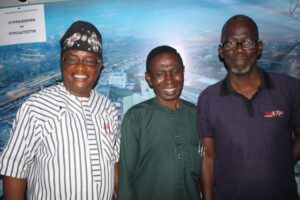Professor Simon Ademola Ajayi, a scholar from the University of Ibadan was our guest on our Radio Show, Parrot Xtra/Ayekooto anchored by Olayinka Agboola on Splash 105.5FM, recently. During the interaction, he shed light on the issues facing Nigeria from the historical perspectives and what the government must do to win the trust of Nigerians again. He also sent out messages to Nigerian politicians. Excerpts:
Many people are of the opinion that studying History, Yoruba, Geography or Philosophy in the University is a waste of time. How will you react to this?
It is not. History is the mother of all subjects and disciplines, Cicero, a great philosopher once stated that “Not to know what took place before you were born is to remain forever a child”. History is the foundation of knowledge; it is the foundation of everything, because you cannot succeed as a medical practitioner without actually knowing the history of your patient, you cannot be a good lawyer without having a thorough historical background of the matter, you cannot be a good journalist without doing background checks. History is the subject around which other disciplines revolve. History is very important.
There was a time the government said schools should not include History in their curriculum; how did scholars from Ibadan School Of History react to that?
It was because of the fear of history, you see, people have skeletons to hide in their cupboards and would not want historians to expose it. Why should you for God’s sake jettison history? By the grace of God I have been privileged to teach in other climes outside Nigeria. I have taught in several universities in Ghana and other parts of Africa. I also taught in a university in the United States of America and I can tell you that History is very important, as a matter of fact, in my history class in the US, we had students in the sciences who took history as one of their minors and they did very well. It is only in Nigeria and a few other developing African countries where History is relegated to the background, but thank God now, they have realized their folly and it has been restored back into our schools’ curriculum.
It is a major subject in the primary, secondary and of course in the university, I think with this, I am sure our nation will begin and continue to march forward in the right direction.
Is this one of the reasons why you came up with your inaugural lecture “Who is not Afraid of History”. Can we just relate it to that?
When we are talking of the fear of History, we are talking of the love and affection for history. For a nation to progress and advance to the next level, such a nation should have a thorough knowledge and background of history. History is like a foundation when you are building a structure, if the foundation is weak or your historical knowledge is weak, it shows that you don’t know where you’re coming from and you may find it difficult to get to a good destination. History gives us a proper direction as to where to go and a nation should not be afraid of history but to love it. History should become part and parcel of our lives, there is no way you can understand Nigeria and Nigerians without going to the historical past. Some people talk about Nigeria as a nation which was amalgamated in 1914 but I can tell you that before the amalgamation of 1914 there were Nigerians. Today, we have not less than 400 ethnic groups in Nigeria, they never lived in isolation, they were interacting, relating and there were inter-group relations between and among them.
We need to have a thorough knowledge about this. For instance, in terms of traditions of origin, we have people, who, today belong to different ethnic groups but which today, claim to have come from a common source and common parentage, for instance, if you study the history of the Hausas, there is a popular “Bayajida legend” and according to this, there were seven main Hausa states and seven subordinate states, those seven subordinate states were really not Hausas, we have the Ilorin Yoruba for instance, the Nupes and several other ethnic groups who are part of them. Today, there is a relationship between Benin and Oyo states, you cannot understand that without a recourse to History -the Oduduwa and Oranmiyan connection. Then linguistically, our colleagues in linguistics made us understand that many Nigerian groups developed from a common parentage, what linguists will call a “proto language”. For instance, many of the languages in Nigeria according to linguists belong to the Niger-Congo family, and of course under the Niger-Congo family we still have sub-groups one of which is the “Kwa sub-group” and if you study the Kwa sub-group you will discover that so many ethnic groups in Nigeria today have common similarities in language, if you are in Igala land today you will think you are in Yoruba land- when an Igala man is speaking, the Yoruba word for water is “omi” and it is the same in the Igala language. “Oko” which means husband in Yoruba is the same in Igala language. The Yoruba word for come and eat is “Wa jeun” while the Igala man will say “Lia jeun”, “Ododo” in Yoruba is “Odolo” in Igala and so on and so forth. You get to Benin among the Edo people, you pray for somebody “May it be well with you” and he says “Ise” while a Yoruba man will say “Ase”, what we are saying is that there are so many areas of commonness among Nigeria Ethnic groups.
There is an ongoing conversation about the Orosanye report approved by President Bola Ahmed Tinubu yesterday for implementation. Can we look at it from the perspective of contemporary Nigerian history?
Yes. I think President Tinubu revisiting this report is very timely, you will agree with me that the cost of governance is on the high side, we have duplication of functions, duplication of roles, we have one institution divided into three among many others with Chief Executive Officer for one and Administrative Assistants for another making governance unnecessarily expensive. Now that we are trying to compress and collapse unnecessary duplication, I don’t think even the duplication has made things to be more effective, it has only caused inter-agency rivalry and of course creating jobs for the “boys” and kind of encouraging patronage or whatever. I think Nigeria has gotten to a level wherein it isn’t the masses alone that should be addressed, let those at the top also be reduced, let us compress the cost of governance and I think this is a step towards the right direction as it will reduce the cost of governance.
What do you think is History’s stance concerning the monarchy, the traditional institution…especially in Yorubaland?
In historical times, kings were great authoritarian and were called “Kabiyesi” which can be translated to mean “The Unquestionable, not-to-be-questioned”. A king like the Alafin of Oyo is called “Iku-Baba Yeye, Alase Ikeji Orisa”, he is called the second in command of the deity, and this can also be said of other kings, they are great authorities. Then, you can’t even look into the eyes of the Ooni of Ife or the Alafin, but now Yoruba kings have become so cheap to the extent that kings are killed in their palace and kidnapped, that is so sorrowful. History has always shown that we need to give great significance to our culture, which is so paramount.
Although the contemporary religions we have adopted are important (Christianity and Islam), but even at that, are we fully following the laws of these religions? We can’t just dump our traditional religion and culture because of a particular new religion because it is not everything in our culture/religion that is bad. Something happened recently somewhere in East Africa- someone stole another person’s belongings and without him protesting, bees formed like a handcuff on the hands of the thief and this led him to report himself personally as the thief.
I am very sure that if measures like these are taken, our politicians will think twice before embezzling government funds and stealing public funds which have led us to where we are today, they will definitely behave in an orderly manner. How will someone swear with the Bible or Quran during swearing in ceremony and after three months begin to do the opposite of what they pledged? Such won’t ever happen during the time of our forefathers. Although human rituals and human killings were among the flaws in our cultural religion which I won’t advise us to go back to. We shouldn’t ultimately do away with our culture.
Those who brought these contemporary religions, what was their real interest, was it to bring us salvation, enslave us or steal from us?
We can’t entirely say they came as usurpers; they genuinely had our interest in mind. At the time of their arrival, there were lots of wrongs in our system. They abolished ritual killings but we should not endeavor to go back to these abnormalities but not all things about our culture were evil. I was discussing with my colleagues recently that, even the whites that brought these religions to us are becoming worse morally day by day, it is amidst them that gay marriage and all sorts of incest are trending in this 21st century for that matter.
Should we adopt that too? That means we can’t adopt everything the white man brought to us, there are lots of things that are good in our culture, you can’t steal in those days and escape in Yoruba land, there was fear in the heart of the people because of the consequences that will follow.

The government said universities in Nigeria are no longer doing relevant and valid research. What is your take on that?
It all starts from the foundation. When I was a student in the University of Ibadan, we fell in love with teaching. That was why I chose to be a teacher. I had other options to choose from but I was encouraged by the lifestyle of our then lecturers, they were models. They had time to go on vacations then, after the end of school sessions and come back refreshed and more learned, but now lecturers don’t even have time to rest not to talk of going on vacations. How much are they even paid? There is no structure and provisions for research. Go to universities outside the country, even those who came for research from abroad live good lives which encourages them to carry out the research appropriately, they lodge in hotels for months because those researches were funded, well funded. Tell me how much and which research is funded in Nigeria.
I want you to seize this opportunity to say one or two things to our political leaders…
To our political leaders, please remember that whatever we do today, we should remember tomorrow because history will never forget us. What does it profit a man if he gains the whole world and loses his soul; there is nothing in gathering up possessions for oneself. It is the legacy you leave behind that will speak for you. Look at men like Ladoke Akintola and Obafemi Awolowo, they are no more now but we still remember them, for their works, free education, free healthcare, development of industrial estates and so on. Look at the Liberty Stadium now Obafemi Awolowo Stadium, it has stood the test of time because of its quality. They have worthy legacies, but today, it is the bread and butter aspect of life that our present day politicians are concentrating on, the roads they are contracted to do don’t even last any longer.







































































